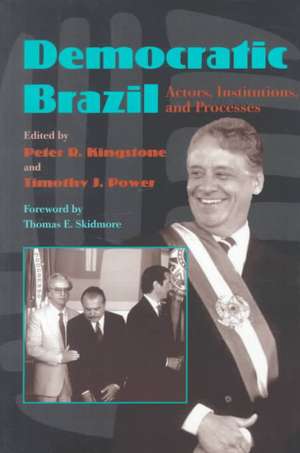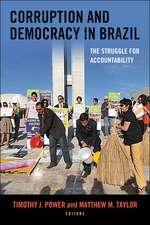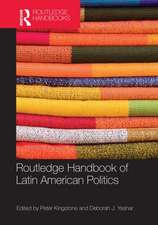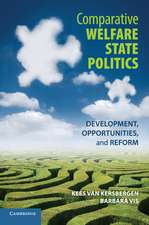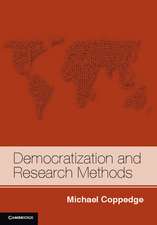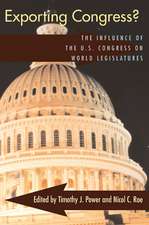Democratic Brazil: Actors, Institutions, and Processes: Pitt Latin American Series
Editat de Peter Kingstone, Timothy J. Poweren Limba Engleză Paperback – 2 mar 2000
After 21 years of military rule, Brazil returned to democracy in 1985. Over the past decade and a half, Brazilians in the Nova República (New Republic) have struggled with a range of diverse challenges that have tested the durability and quality of the young democracy. How well have they succeeded? To what extent can we say that Brazilian democracy has consolidated? What actors, institutions, and processes have emerged as most salient over the past 15 years? Although Brazil is Latin America's largest country, the world's third largest democracy, and a country with a population and GNP larger than Yeltsin's Russia, more than a decade has passed since the last collaborative effort to examine regime change in Brazil, and no work in English has yet provided a comprehensive appraisal of Brazilian democracy in the period since 1985.
Democratic Brazil analyzes Brazilian democracy in a comprehensive, systematic fashion, covering the full period of the New Republic from Presidents Sarney to Cardoso. Democratic Brazil brings together twelve top scholars, the “next generation of Brazilianists,” with wide-ranging specialties including institutional analysis, state autonomy, federalism and decentralization, economic management and business-state relations, the military, the Catholic Church and the new religious pluralism, social movements, the left, regional integration, demographic change, and human rights and the rule of law. Each chapter focuses on a crucial process or actor in the New Republic, with emphasis on its relationship to democratic consolidation. The volume also contains a comprehensive bibliography on Brazilian politics and society since 1985. Prominent Brazilian historian Thomas Skidmore has contributed a foreword to the volume.
Democratic Brazil speaks to a wide audience, including Brazilianists, Latin Americanists generally, students of comparative democratization, as well as specialists within the various thematic subfields represented by the contributors. Written in a clear, accessible style, the book is ideally suited for use in upper-level undergraduate courses and graduate seminars on Latin American politics and development.
Democratic Brazil analyzes Brazilian democracy in a comprehensive, systematic fashion, covering the full period of the New Republic from Presidents Sarney to Cardoso. Democratic Brazil brings together twelve top scholars, the “next generation of Brazilianists,” with wide-ranging specialties including institutional analysis, state autonomy, federalism and decentralization, economic management and business-state relations, the military, the Catholic Church and the new religious pluralism, social movements, the left, regional integration, demographic change, and human rights and the rule of law. Each chapter focuses on a crucial process or actor in the New Republic, with emphasis on its relationship to democratic consolidation. The volume also contains a comprehensive bibliography on Brazilian politics and society since 1985. Prominent Brazilian historian Thomas Skidmore has contributed a foreword to the volume.
Democratic Brazil speaks to a wide audience, including Brazilianists, Latin Americanists generally, students of comparative democratization, as well as specialists within the various thematic subfields represented by the contributors. Written in a clear, accessible style, the book is ideally suited for use in upper-level undergraduate courses and graduate seminars on Latin American politics and development.
Din seria Pitt Latin American Series
-
 Preț: 429.67 lei
Preț: 429.67 lei -
 Preț: 450.40 lei
Preț: 450.40 lei -
 Preț: 355.58 lei
Preț: 355.58 lei -
 Preț: 431.62 lei
Preț: 431.62 lei -
 Preț: 392.66 lei
Preț: 392.66 lei -
 Preț: 388.79 lei
Preț: 388.79 lei -
 Preț: 428.14 lei
Preț: 428.14 lei -
 Preț: 362.33 lei
Preț: 362.33 lei -
 Preț: 416.05 lei
Preț: 416.05 lei -
 Preț: 393.58 lei
Preț: 393.58 lei -
 Preț: 330.31 lei
Preț: 330.31 lei -
 Preț: 394.57 lei
Preț: 394.57 lei -
 Preț: 389.76 lei
Preț: 389.76 lei -
 Preț: 334.31 lei
Preț: 334.31 lei -
 Preț: 388.79 lei
Preț: 388.79 lei -
 Preț: 396.85 lei
Preț: 396.85 lei -
 Preț: 350.79 lei
Preț: 350.79 lei - 17%
 Preț: 445.11 lei
Preț: 445.11 lei -
 Preț: 388.03 lei
Preț: 388.03 lei -
 Preț: 365.05 lei
Preț: 365.05 lei -
 Preț: 457.11 lei
Preț: 457.11 lei -
 Preț: 471.15 lei
Preț: 471.15 lei - 17%
 Preț: 384.07 lei
Preț: 384.07 lei -
 Preț: 428.14 lei
Preț: 428.14 lei -
 Preț: 389.17 lei
Preț: 389.17 lei -
 Preț: 394.65 lei
Preț: 394.65 lei -
 Preț: 429.89 lei
Preț: 429.89 lei -
 Preț: 392.66 lei
Preț: 392.66 lei -
 Preț: 424.88 lei
Preț: 424.88 lei -
 Preț: 389.38 lei
Preț: 389.38 lei -
 Preț: 432.57 lei
Preț: 432.57 lei -
 Preț: 419.06 lei
Preț: 419.06 lei -
 Preț: 393.58 lei
Preț: 393.58 lei -
 Preț: 354.23 lei
Preț: 354.23 lei -
 Preț: 458.07 lei
Preț: 458.07 lei -
 Preț: 389.76 lei
Preț: 389.76 lei -
 Preț: 363.26 lei
Preț: 363.26 lei -
 Preț: 502.82 lei
Preț: 502.82 lei -
 Preț: 423.91 lei
Preț: 423.91 lei -
 Preț: 395.54 lei
Preț: 395.54 lei -
 Preț: 153.64 lei
Preț: 153.64 lei -
 Preț: 351.72 lei
Preț: 351.72 lei -
 Preț: 383.01 lei
Preț: 383.01 lei -
 Preț: 393.58 lei
Preț: 393.58 lei -
 Preț: 351.55 lei
Preț: 351.55 lei -
 Preț: 351.72 lei
Preț: 351.72 lei -
 Preț: 389.76 lei
Preț: 389.76 lei -
 Preț: 331.86 lei
Preț: 331.86 lei -
 Preț: 358.46 lei
Preț: 358.46 lei -
 Preț: 362.95 lei
Preț: 362.95 lei
Preț: 424.88 lei
Nou
Puncte Express: 637
Preț estimativ în valută:
81.31€ • 88.29$ • 68.30£
81.31€ • 88.29$ • 68.30£
Carte tipărită la comandă
Livrare economică 23 aprilie-07 mai
Preluare comenzi: 021 569.72.76
Specificații
ISBN-13: 9780822957140
ISBN-10: 0822957140
Pagini: 360
Dimensiuni: 152 x 229 x 30 mm
Greutate: 0.5 kg
Ediția:1
Editura: University of Pittsburgh Press
Colecția University of Pittsburgh Press
Seria Pitt Latin American Series
ISBN-10: 0822957140
Pagini: 360
Dimensiuni: 152 x 229 x 30 mm
Greutate: 0.5 kg
Ediția:1
Editura: University of Pittsburgh Press
Colecția University of Pittsburgh Press
Seria Pitt Latin American Series
Recenzii
“stands out sharply as the first thorough and systematic book-length evaluation of the workings, progress and products of Brazilian democracy over the 15 years since the military dictatorship ended in 1985. ... The book is particularly strong in its examination of the social aspects of Brazilian democracy. ...covers the gamut for a comprehensive, thorough and nuanced picture of Brazilian politics that is a commendable starting point for the academic generalist or the advanced undergraduate yet provides new insights and interconnections for the laready informed specialist.”
—Latin American Politics and Society
—Latin American Politics and Society
